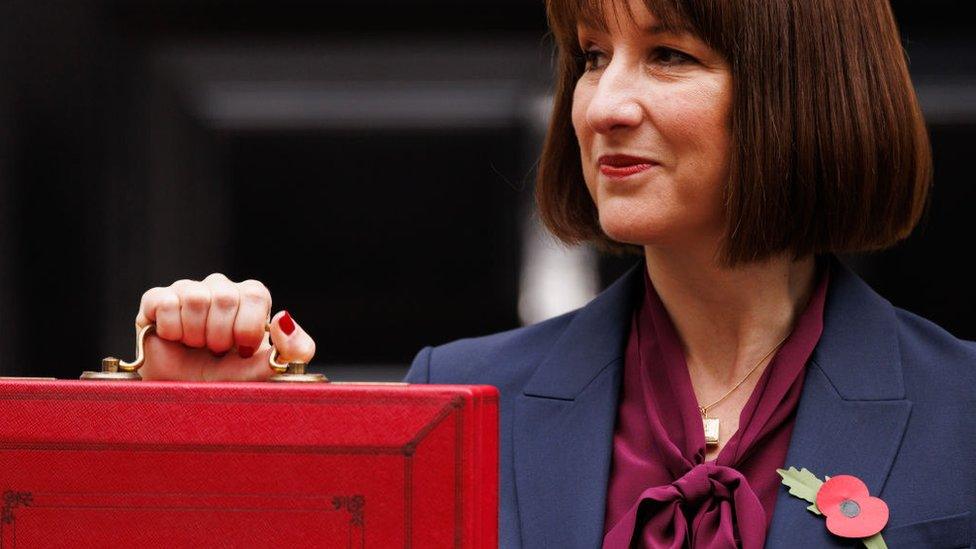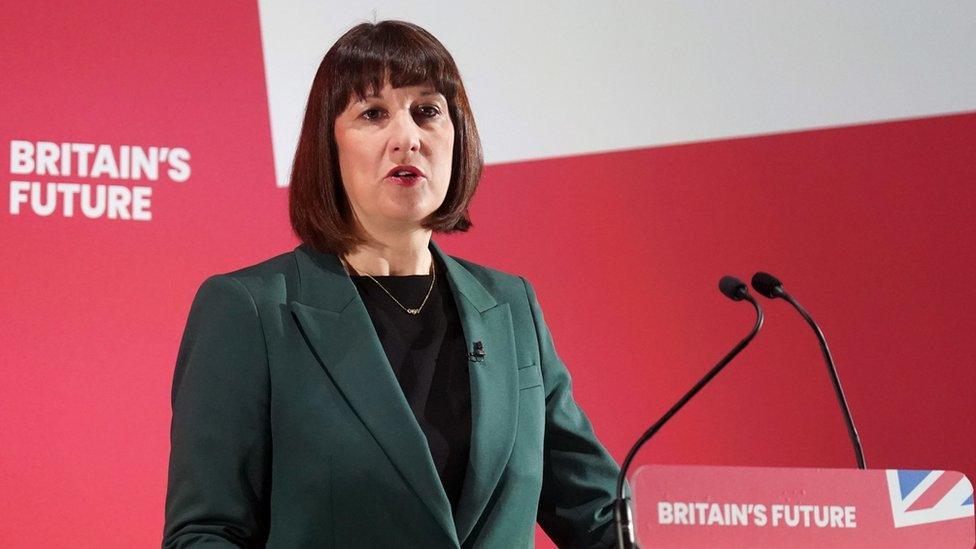Labour vows to fund NHS pledges by tackling tax dodgers
- Published
- comments
Reeves: Tackling tax dodgers "not rocket science"
Labour is pledging to fund policies on the NHS and school breakfast clubs by boosting efforts to tackle tax dodgers.
Shadow chancellor Rachel Reeves says plans to give more money to tax officials would help raise £5bn a year.
The party had to find a way to plug the gap in its spending commitments after the government adopted its plan to scrap non-dom tax status.
It says it will also raise £2.6bn by closing "loopholes" in the government's plans to abolish non-dom exemptions.
Non-doms are UK residents whose permanent home for tax purposes is abroad, meaning they do not have to pay UK tax on money they earn overseas.
If it wins power, Labour said it would scrap a proposed 50% discount on the tax non-doms would have to pay in the first year of the new rules.
It said all foreign assets held in offshore trusts would also be subject to UK inheritance tax, while the government has said those held in a trust set up before April 2025 would be excluded from inheritance tax permanently.
Ms Reeves insisted she was "confident" her plans would raise the amount Labour had estimated.
Speaking to BBC Radio 4's Today programme, she denied the sums were "small change" compared to the potential cuts facing public services, saying Labour's plans for the NHS and schools would make "a massive difference to millions of people".
The government said it had already brought in 200 measures to tackle tax non-compliance.
Treasury Minister Laura Trott said: "After a month of searching for a plan to pay for Labour's unfunded spending, the shadow chancellor still cannot say how she will fill the enormous black hole in their promises. And that means one thing - more taxes."
Labour had been planning to pay for flagship pledges - including £365m for free school breakfast clubs and £1.6bn for more hospital and dental appointments - by replacing the UK's current non-dom tax regime.
However at his spring Budget, Chancellor Jeremy Hunt said he would change the non-dom tax rules to pay for a cut to National Insurance.
Labour has a self-imposed rule that, if elected, it will not borrow to fund day-to-day spending and following Mr Hunt's non-doms announcement the party faced questions as to how it would fund its existing promises.
Now, Ms Reeves has set out her alternative plan, which also includes strengthening the government's proposed replacement of non-dom rules.
The party says these changes could bring in £1bn in one year, rising to £2.6bn over the course of the next Parliament.
Ms Reeves said her party would also give the HM Revenues and Customs (HMRC) more resources to tackle tax avoidance and evasion, spending £555m on increasing the number of tax officers.
It also wants to invest in digitising the tax office to improve customer services and "free up resources to focus on more complex cases".
Tax gap
Citing HMRC figures, Labour said the gap between the amount of tax owed and what the government actually collects stood at £36bn in 2021/22.
The party also points to a recent Financial Times interview, external in which the head of the spending watchdog the National Audit Office said the government could save £6bn a year by tackling tax evasion and avoidance.
This, the party estimates, would raise £0.7bn in 2025/26 growing to £5.1bn a year by the end of the Parliament.
In an interview with the BBC, Ms Reeves said past governments had managed to close the tax gap but that it had plateaued in recent years
"It's not rocket science, it's about properly resourcing HMRC, making sure more cases are investigated," she said.
She also said Labour were setting up an expert panel to advise the party on tackling tax avoidance and modernising HMRC.
The panel will include Sir Edward Troup, a former senior Treasury civil servant, and Margaret Hodge, an MP who chaired the influential Public Accounts Committee.
Helen Miller, deputy director of the Institute of Fiscal Studies think tank, said it was "common for governments to announce plans to try to raise revenue by reducing avoidance or evasion".
However, she said there was uncertainty over how much this could raise and how quickly.
HMRC has been calculating the tax gap - the difference between how much money is raised in taxes and a theoretical calculation of how much could be raised - since 2005.
It says there has been a "long-term reduction", external with the gap falling from 7.5% in 2005 - when Labour was in power - to 4.8% in 2021/22.
Previous attempts to close this gap have not always been as successful as hoped.
In 2010 the Conservative-Liberal Democrat coalition government announced £900m to beef up HMRC but it did not really work.
In fact the tax gap as a percentage of GDP stayed flat and then started edging up until 2013 when a crackdown on VAT non-payment and fraud was much more successful.
In total since 2010 the tax gap has come down from just under 2% of GDP to 1.5%, but since the pandemic it has been creeping up again.
High net worth individuals and businesses also tend to respond to whatever measures are brought in and can afford expensive lawyers to find new ways to test the legal limits of tax policy.
The UK has a relatively low tax gap compared to other countries such as the US, Australia and Italy, and it becomes harder to raise revenue after the low-hanging fruit has been picked off.
Liberal Democrat Treasury spokeswoman Sarah Olney MP said: "Tinkering around the edges won't be nearly enough."
She added: "The Liberal Democrats have set out fully-costed plans to make sure everyone can get the care they need."
Related topics
- Published7 March 2024

- Published23 January

- Published19 March 2024

- Published1 February 2024

